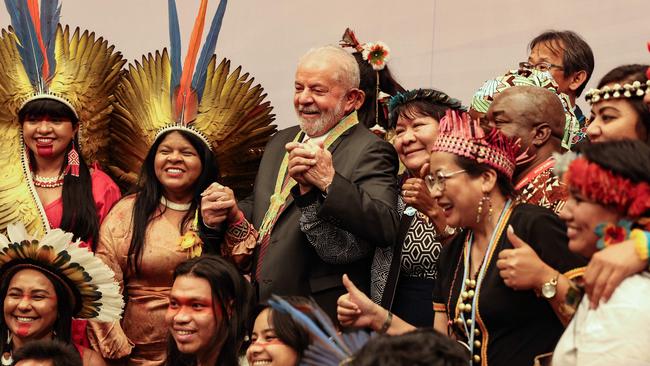COP27 progress: Closer, and yet still so far
After almost two weeks of talks beset by Egyptian spying, food and water shortages and chaotic late-night meetings, what progress have countries made on climate change?

After almost two weeks of talks beset by Egyptian spying, food and water shortages, chaotic late-night meetings and even a river of sewage flowing along a main path, what progress have countries made on climate change?
Loss and damage
Debates over the economic losses and damages caused by climate change, such as Pakistan’s estimated $US30bn ($45bn) bill for recent flooding, dominated the conference. Poorer countries have argued that richer countries, responsible for most historical carbon emissions, should compensate them for the ravages of global warming.
The EU tried to unlock the stalled negotiations by backing a fund. The offer came with two strings attached: countries making deeper emissions cuts, and the fund’s donors coming from a broad base including China, and potentially airlines and oil companies.
Exactly how the fund would work and which countries would be eligible is not clear yet. The latest draft of a final deal implies that the money would be directed to the world’s 46 least developed countries, including many African states and small island states such as Tuvalu.
Progress: 4/5
Keeping 1.5C alive
The mantra for COP26 last year was “keep 1.5C alive”. Countries at this year’s summit failed to increase their ambition beyond what they promised in Glasgow. The EU promised an emissions cut two percentage points deeper than previously.
Turkey, one of the G20 countries responsible for about three-quarters of global emissions, belatedly issued a plan, but it will mean emissions rising for several years. Arguably the best news came midway through COP27, when the G20 in Bali reaffirmed its commitment to 1.5C.
Progress: 2/5
Ending fossil fuels
India surprised some delegates when it proposed that the conference throw its weight behind a plan to “phase down” all fossil fuels. The idea gained momentum, with the EU and other countries giving their support to the idea of ending oil and gas too. But the proposal failed to make its way into any of the draft documents that formed the basis of the COP27 agreement. Nonetheless, one governmental delegate said that a pledge to phase out fossil fuels was still in the gift of the Egyptian diplomats running the talks, given the broad backing for the proposal.
Progress: 2/5
Nature
Luiz Inacio Lula da Silva was greeted like a rock star when he arrived at the conference, where he met the head of the UN and the Chinese and US climate envoys. The Brazilian president-elect promised to do “whatever it takes” to end deforestation in the Amazon and make climate change a high priority for his government. British Prime Minister Rishi Sunak made a lower-key intervention at the start of the conference, offering £90m ($160m) to protecting forests in the Congo basin.
However, there was disappointment that the final outcome in Egypt looked unlikely to even mention COP15, a UN biodiversity conference in Canada next month. “We must ensure that the two COPs are linked and countries jointly address the interconnected climate and nature crises,” said Cassie Flynn, head of climate policy at the UN development program.
Progress: 1/5
Adapting to a warming world
In February, climate scientists warned that climate change had caused widespread, irreversible effects that were already outpacing humanity’s ability to adapt. Summit negotiators provisionally made a commitment to doubling financing to adapt to a warming world by 2025, through better flood defences, more drought-resistant crops and other measures.
They also made progress on moving towards a global goal on adaptation, similar to the ones that exist on curbing emissions. Exactly what that will look like is a decision for future climate conferences.
“I think we have made significant progress,” said Nisha Krishnan of US think tank the World Resources Institute.
Progress 3/5
The Times



To join the conversation, please log in. Don't have an account? Register
Join the conversation, you are commenting as Logout